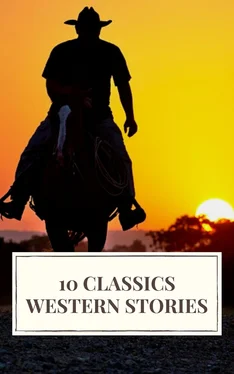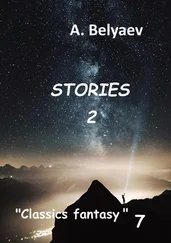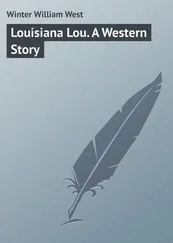Samuel Merwin - 10 Classics Western Stories
Здесь есть возможность читать онлайн «Samuel Merwin - 10 Classics Western Stories» — ознакомительный отрывок электронной книги совершенно бесплатно, а после прочтения отрывка купить полную версию. В некоторых случаях можно слушать аудио, скачать через торрент в формате fb2 и присутствует краткое содержание. Жанр: unrecognised, на английском языке. Описание произведения, (предисловие) а так же отзывы посетителей доступны на портале библиотеки ЛибКат.
- Название:10 Classics Western Stories
- Автор:
- Жанр:
- Год:неизвестен
- ISBN:нет данных
- Рейтинг книги:3 / 5. Голосов: 1
-
Избранное:Добавить в избранное
- Отзывы:
-
Ваша оценка:
- 60
- 1
- 2
- 3
- 4
- 5
10 Classics Western Stories: краткое содержание, описание и аннотация
Предлагаем к чтению аннотацию, описание, краткое содержание или предисловие (зависит от того, что написал сам автор книги «10 Classics Western Stories»). Если вы не нашли необходимую информацию о книге — напишите в комментариях, мы постараемся отыскать её.
The novels are sorted alphabetically by the authors.
Content:
The Log of a Cowboy by Andy Adams
The Bridge of the Gods by Frederic Homer Balch
The Lure of the Dim Trails by B.M. Bower
Hidden Water by Dane Coolidge
The Last of the Mohicans by James Fenimore Cooper
The Prairie by James Fenimore Cooper
Salomy Jane by Bret Harte
Astoria by Washington Irving
The road to Frontenac by Samuel Merwin
That Girl Montana by Marah Ellis Ryan
10 Classics Western Stories — читать онлайн ознакомительный отрывок
Ниже представлен текст книги, разбитый по страницам. Система сохранения места последней прочитанной страницы, позволяет с удобством читать онлайн бесплатно книгу «10 Classics Western Stories», без необходимости каждый раз заново искать на чём Вы остановились. Поставьте закладку, и сможете в любой момент перейти на страницу, на которой закончили чтение.
Интервал:
Закладка:
The old chief seemed not the least disconcerted, but begged for five beeves, as many of the squaws were in the encampment across the North Fork, those present being not quite half of his village. It was now getting late in the day and the band seemed to be getting tired of the parleying, a number of squaws having already set out on their return to the village. After some further talk, Flood agreed to add another beef, on condition they be taken to the encampment before being killed. This was accepted, and at once the entire band set up a chattering in view of the coming feast. The cattle had in the mean time grazed off nearly a mile, the outfit, however, holding them under a close herd during the powwowing. All the bucks in the band, numbering about forty, now joined us, and we rode away to the herd. I noticed, by the way, that quite a number of the younger braves had arms, and no doubt they would have made a display of force had Flood's diplomacy been of a more warlike character. While drifting the herd back to the trail we cut out a big lame steer and two stray cows for the Indians, who now left us and followed the beeves which were being driven to their village.
Flood had instructed Quarternight and me to invite the two Apaches to our camp for the night, on the promise of sugar, coffee, and tobacco. They consulted with the old chief, and gaining his consent came with us. We extended the hospitality of our wagon to our guests, and when supper was over, promised them an extra beef if they would give us particulars of the trail until it crossed the North Fork, after that river turned west towards the Pan-handle. It was evident that they were familiar with the country, for one of them accepted our offer, and with his finger sketched a rude map on the ground where there had formerly been a camp-fire. He outlined the two rivers between which we were then encamped, and traced the trail until it crossed the North Fork or beyond the Indian reservation. We discussed the outline of the trail in detail for an hour, asking hundreds of unimportant questions, but occasionally getting in a leading one, always resulting in the information wanted. We learned that the big summer encampment of the Comanches and Kiowas was one day's ride for a pony or two days' with cattle up the trail, at the point where the divide between Salt and North Fork narrows to about ten miles in width. We leeched out of them very cautiously the information that the encampment was a large one, and that all herds this year had given up cattle, some as many as twenty-five head.
Having secured the information we wanted, Flood gave to each Apache a package of Arbuckle coffee, a small sack of sugar, and both smoking and chewing tobacco. Quarternight informed them that as the cattle were bedded for the night, they had better remain until morning, when he would pick them out a nice fat beef. On their consenting, Fox stripped the wagon sheet off the wagon and made them a good bed, in which, with their body blankets, they were as comfortable as any of us. Neither of them was armed, so we felt no fear of them, and after they had lain down on their couch, Flood called Quarternight and me, and we strolled out into the darkness and reviewed the information. We agreed that the topography of the country they had given was most likely correct, because we could verify much of it by maps in our possession. Another thing on which we agreed was, that there was some means of communication between this small and seemingly peaceable band and the main encampment of the tribe; and that more than likely our approach would be known in the large encampment before sunrise. In spite of the good opinion we entertained of our guests, we were also satisfied they had lied to us when they denied they had been in the large camp since the trail herds began to pass. This was the last question we had asked, and the artful manner in which they had parried it showed our guests to be no mean diplomats themselves.
Our camp was astir by daybreak, and after breakfast, as we were catching our mounts for the day, one of the Apaches offered to take a certain pinto horse in our remuda in lieu of the promised beef, but Flood declined the offer. On overtaking the herd after breakfast, Quarternight cut out a fat two year old stray heifer, and he and I assisted our guests to drive their beef several miles toward their village. Finally bidding them farewell, we returned to the herd, when the outfit informed us that Flood and The Rebel had ridden on ahead to look out a crossing on the Salt Fork. From this move it was evident that if a passable ford could be found, our foreman intended to abandon the established route and avoid the big Indian encampment.
On the return of Priest and Flood about noon, they reported having found an easy ford of the Salt Fork, which, from the indications of their old trails centring from every quarter at this crossing, must have been used by buffalo for generations. After dinner we put our wagon in the lead, and following close at hand with the cattle, turned off the trail about a mile above our noon camp and struck to the westward for the crossing. This we reached and crossed early that evening, camping out nearly five miles to the west of the river. Rain was always to be dreaded in trail work, and when bedding down the herd that night, we had one of the heaviest downpours which we had experienced since leaving the Rio Grande. It lasted several hours, but we stood it uncomplainingly, for this fortunate drenching had obliterated every trace left by our wagon and herd since abandoning the trail, as well as the sign left at the old buffalo crossing on the Salt Fork. The rain ceased about ten o'clock, when the cattle bedded down easily, and the second guard took them for their watch. Wood was too scarce to afford a fire, and while our slickers had partially protected us from the rain, many of us went to bed in wet clothing that night. After another half day's drive to the west, we turned northward and traveled in that direction through a nice country, more or less broken with small hills, but well watered. On the morning of the first day after turning north, Honeyman reported a number of our saddle horses had strayed from camp. This gave Flood some little uneasiness, and a number of us got on our night horses without loss of time and turned out to look up the missing saddle stock. The Rebel and I set out together to the southward, while others of the outfit set off to the other points of the compass.
I was always a good trailer, was in fact acknowledged to be one of the best, with the exception of my brother Zack, on the San Antonio River, where we grew up as boys. In circling about that morning, I struck the trail of about twenty horses—the missing number—and at once signaled to Priest, who was about a mile distant, to join me. The ground was fortunately fresh from the recent rain and left an easy trail. We galloped along it easily for some little distance, when the trail suddenly turned and we could see that the horses had been running, having evidently received a sudden scare. On following up the trail nearly a mile, we noticed where they had quieted down and had evidently grazed for several hours, but in looking up the trail by which they had left these parts, Priest made the discovery of signs of cattle. We located the trail of the horses soon, and were again surprised to find that they had been running as before, though the trail was much fresher, having possibly been made about dawn. We ran the trail out until it passed over a slight divide, when there before us stood the missing horses. They never noticed us, but were standing at attention, cautiously sniffing the early morning air, on which was borne to them the scent of something they feared. On reaching them, their fear seemed not the least appeased, and my partner and I had our curiosity sufficiently aroused to ride forward to the cause of their alarm. As we rounded the spur of the hill, there in plain view grazed a band of about twenty buffalo. We were almost as excited as the horses over the discovery. By dropping back and keeping the hill between us and them, then dismounting and leaving our horses, we thought we could reach the apex of the hill. It was but a small elevation, and from its summit we secured a splendid view of the animals, now less than three hundred yards distant. Flattening ourselves out, we spent several minutes watching the shaggy animals as they grazed leisurely forward, while several calves in the bunch gamboled around their mothers. A buffalo calf, I had always heard, made delicious veal, and as we had had no fresh meat since we had started, I proposed to Priest that we get one. He suggested trying our ropes, for if we could ever get within effective six-shooter range, a rope was much the surest. Certainly such cumbrous, awkward looking animals, he said, could be no match for our Texas horses. We accordingly dropped back off the hill to our saddle stock, when Priest said that if he only had a certain horse of his out of the band we had been trailing he would promise me buffalo veal if he had to follow them to the Pan-handle. It took us but a few minutes to return to our horses, round them in, and secure the particular horse he wanted. I was riding my Nigger Boy, my regular night horse, and as only one of my mount was in this bunch,—a good horse, but sluggish,—I concluded to give my black a trial, not depending on his speed so much as his staying qualities. It took but a minute for The Rebel to shift his saddle from one horse to another, when he started around to the south, while I turned to the north, so as to approach the buffalo simultaneously. I came in sight of the band first, my partner having a farther ride to make, but had only a few moments to wait, before I noticed the quarry take alarm, and the next instant Priest dashed out from behind a spur of the hill and was after them, I following suit. They turned westward, and when The Rebel and I came together on the angle of their course, we were several hundred yards in their rear. My bunkie had the best horse in speed by all odds, and was soon crowding the band so close that they began to scatter, and though I passed several old bulls and cows, it was all I could do to keep in sight of the calves. After the chase had continued over a mile, the staying qualities of my horse began to shine, but while I was nearing the lead, The Rebel tied to the largest calf in the bunch. The calf he had on his rope was a beauty, and on overtaking him, I reined in my horse, for to have killed a second one would have been sheer waste. Priest wanted me to shoot the calf, but I refused, so he shifted the rope to the pommel of my saddle, and, dismounting, dropped the calf at the first shot. We skinned him, cut off his head, and after disemboweling him, lashed the carcass across my saddle. Then both of us mounted Priest's horse, and started on our return.
Читать дальшеИнтервал:
Закладка:
Похожие книги на «10 Classics Western Stories»
Представляем Вашему вниманию похожие книги на «10 Classics Western Stories» списком для выбора. Мы отобрали схожую по названию и смыслу литературу в надежде предоставить читателям больше вариантов отыскать новые, интересные, ещё непрочитанные произведения.
Обсуждение, отзывы о книге «10 Classics Western Stories» и просто собственные мнения читателей. Оставьте ваши комментарии, напишите, что Вы думаете о произведении, его смысле или главных героях. Укажите что конкретно понравилось, а что нет, и почему Вы так считаете.












